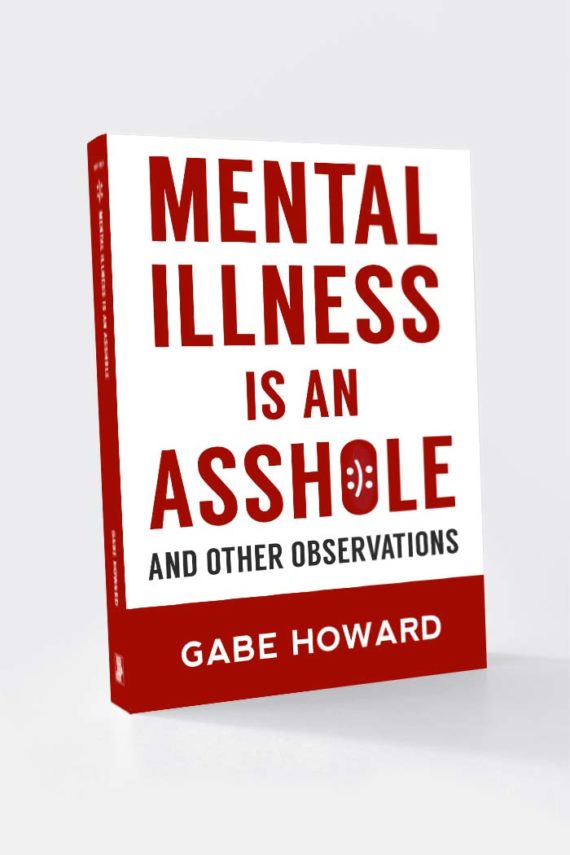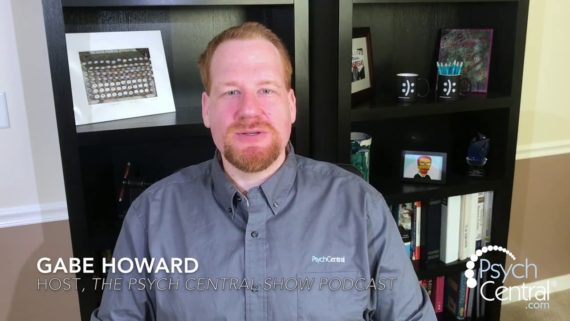
(2-12-19) Gabe Howard, a contributor to my blog and someone living with mental illnesses whom I admire, has published a collection of his thoughts and writings in a new book entitled: Mental Illness Is An Asshole And Other Observations.
In two to three page essays he writes about such everyday topics as “How To Handle A Teen’s Dramatic or Manipulative Suicide Threat,” “My Mom Doesn’t Understand What It’s Like To Be Openly Bipolar,” “Integrity in the Face of Adversity,” “How do I Make My family Understand Depression?” and “Why My Spouse Doesn’t Resent Me For Having Bipolar.”
Gabe’s knowledge comes from his lived experiences, which he shares with a wonderful blend of seriousness, humor, poignancy and insights. While everyone is unique, Gabe’s book helped me better understand my own son and others living with mental illnesses, and I am grateful for that.
Gabe was kind enough to allow me to reprint his essay:
The Benefits of Bipolar Disorder by Gabe Howard
I am often asked, both in person and online, about the benefits of bipolar disorder.
This isn’t an ignorant question. The media is filled with examples of mental illness making people better detectives, artists or creating other ‘super powers.’ The people who ask this question are varied, as well. Family and friends, the inquiring public, and even people living with bipolar disorder all want to know the upsides of this illness.
And it’s a very easy question to answer:
There aren’t any.
The Benefits of Cancer
My grandfather spent several years dying of cancer when I was a teenager. It was a long process and it took its toll on my family. It was the first time I saw my father cry and it was the first time I watched a person go from strong and healthy to practically nothing, and finally succumbing to disease.
My grandfather fought cancer daily and, even though it finally took him, there were some bright spots during those years. Cancer made him humble, it gave him time to slow down and talk with his family. Over the years, he got weaker and weaker and we would all come rushing to be with him when we thought the end was near. This would not only allow us to visit with him, but with each other.
Ultimately, cancer took my grandfather from us.
If I credited cancer for the bonds we formed and the togetherness of family, people would be appalled. They would give cancer zero-credit in this scenario.
They would credit the love we share, the strength of my family and they would see that cancer got in the way of our relationships, rather than helping us.
Bipolar Doesn’t Have an Upside: People Do
Bipolar disorder is a terrible burden.
I have suffered greatly because of it and will probably continue to do so.
I have a fantastic life. I love my wife, friend, and career, but this is in spite of bipolar disorder, not because of it. The good things in my life are not benefits of bipolar disorder, but of my hard work, my triumph over circumstance and my dedication to recovery and wellness.
Nothing good comes from bipolar disorder, only negatives. The way a person fights the disorder, the success of treatment, or the togetherness of family isn’t because of bipolar disorder, but because of the person fighting it. The silver lining is spun entirely from the amazing people living with the disease.
Bipolar disorder takes a lot from a person. Let’s not give it credit for all the good things that happen to us. We earned our success, our wellness and fought thorough the darkness and now bipolar wants credit for that? All of the amazing things that define us as people are exactly what bipolar disorder is trying to take away.
A good thing coming from a bad situation is not a benefit. I have never been one to stand by and say the benefit of a child dying is that the parents will have more free time and disposable income. While that statement may be true, let’s not put a positive spin on something so tragic.
Bipolar disorder is the same way. The disorder does not cause happiness, it prevents it.
People with any mental illness need to take credit for success because they earned it. That perseverance is a testament to who we are as people. Our illnesses didn’t gift us anything.
We are the sum of our experiences and, while bipolar disorder certainly plays a role in defining who we are, the credit for living well goes to us. Allowing bipolar disorder to share in that success ignores all that this illness takes away.
When we spin that suffering into something amazing, it’s because we are amazing.
We triumphed in the face of despair. *
About the author:
Gabe Howard is an award-winning podcast host, speaker, and writer who lives with bipolar and anxiety disorders. He’s the host of The Psych Central Show podcast (iTunes health top 10) and co-hosts A Bipolar, A Schizophrenic, and A Podcast; the first podcast by people with mental illness, for people with mental illness. He has written for Psych Central, WebMD, bipolar magazine, and other distinguished publications. He also is popular speaker. You can read more at www.gabehoward.com
*This essay by Gabe was first published in Elephant Journal on 2-10-15
While his book is available through Amazon, its fastest if you order directly from him. He will autograph it and also send along free stickers to share with your friends.




